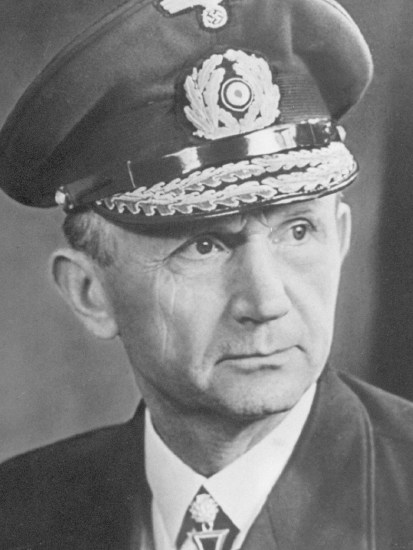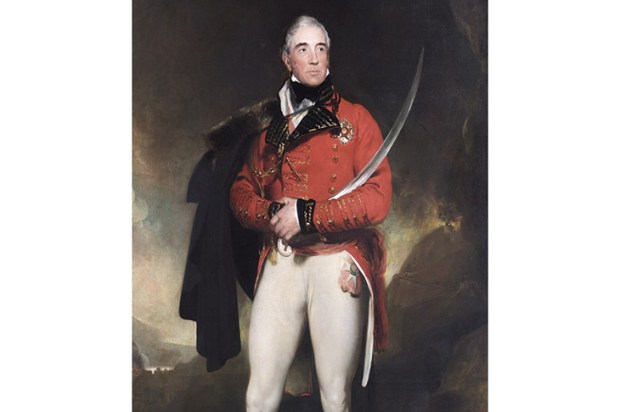‘If the war is lost, then it is of no concern to me if the people perish in it.’ Bruno Ganz, who not so much portrays Hitler as becomes him in Bernd Eichinger’s 2004 film Der Untergang (Downfall), spits the Führer’s nihilist venom so convincingly that the fundamental insanity of Nazism is at once laid bare, even to his closest collaborators. The madness of Nazism is now merely Hitler himself, and when on 30 April Ganz/Hitler, entombed in the Führerbunker, shoots himself, the film’s tension is at once gone. What follows is just rats fleeing the hole; and the rest, as it were, is silence.
But it was not. VE (Victory in Europe) Day was not celebrated in London until 8 May, and in Moscow on 9 May. What happened in those last ten days of the war, ‘after Hitler’?
The stories have long been told, beginning with Hugh Trevor-Roper’s semi-official The Last Days of Hitler, but this ambitious book attempts to draw together the many threads during the period of the empty tomb. The author is steeped in the more Wagnerian aspects of the war, though the repulse of German forces from Moscow at the end of 1941 was surely not, as he claims, ‘the Führer’s first significant defeat’, for what otherwise was the failure to subdue Britain in 1940? Michael Jones wishes to show the reason for and significance of the two VE Days — divisions which nearly caused a fatal rift between the Allies, a ‘crisis largely hidden from public view and in the event… successfully mastered’.
The Yalta conference of the ‘big three’ (Stalin, Roosevelt and Churchill) in February 1945 had agreed the occupation zones in Germany, and the armies had advanced according to those arrangements, but by May mutual suspicion was gaining the upper hand, especially after Roosevelt’s death on 12 April. Truman was warier of Russia than FDR had been (his first meeting with Molotov, the foreign minister, on 23 April was confrontational), and Churchill had never had much confidence that Stalin would stick to the agreements, worried especially about Denmark, fearing the Red Army would make a sprint for the Jutland peninsula. The Russians would indeed occupy Danish territory — the easternmost island, Bornholm — but only after asking leave of the Supreme (Western) Allied Commander, Eisenhower. They stayed there until April 1946.
But the Nazis were not done yet. Hitler’s last will and testament appointed neither Göring nor Himmler as his successor, as might have been expected, but Admiral Karl Dönitz, head of the navy — though as Reichspräsident not Führer (hollow titles both). It is astonishing, perhaps, that Hitler could believe his will would be expedited, but for three weeks it was, until Dönitz and his ‘government’, never formally recognised by the Allies, were arrested by British troops, in Flensburg on the German-Danish border.
Dönitz remains to some, as one of his U-boat captains wrote, ‘a total patriot — [who] saw himself as a servant of his people and Fatherland’. The war correspondent and author of Das Boot, Lothar-Günther Buchheim, saw him differently however: ‘a harbinger of death — a party lackey, who could not have been more contemptible.’ On the convincing evidence Jones cites, not least the orders to the armed forces to continue fighting, Dönitz was lucky to escape the noose at Nuremberg. He lived until 1980, unrepentant and comfortable, in the ambivalence that was Cold War Germany.
Dönitz’s orders exploited the faultlines of Yalta but were fundamentally Nazi rather than patriotic. The admiral could not accept the Allies’ terms — unconditional surrender — nor would he in any circumstances let German troops surrender to the Red Army. He schemed to set the western Allies against the Russians — or rather, dreamed, in the way that Hitler had. Isolated pockets of German troops, in Courland (now Latvia) for example, were ordered to hold out against attack, at hideous cost to the troops and even worse to civilians (the SS exceeded themselves in the massacre of women and children). Equally costly attacks were made to recapture ‘strategically vital ground’. On 6 May, when the whole world knew that Hitler was dead, the town of Zobten, 30 miles from Breslau, south-east of Berlin (Breslau itself being held at pitiable cost in civilian casualties), was retaken in a murderous counter-attack ordered by Ferdinand Schörner. He had been promoted field marshal from the bunker in the last days — another who, inexplicably, escaped capital justice at Nuremberg.
In these last days, senior Allied generals were as much proconsuls as military commanders. There were practical humanitarian problems to confront as well as the German army, such as feeding the semi-starving population of still-occupied north-west Holland, the liberation of the concentration camps, the tide of displaced German civilians running west, as well as the nervous junctions with the Red Army. In the north, Field Marshal Montgomery had a difficult time managing the surrender of huge numbers of German troops, which involved pragmatic arrangements with Dönitz’s regime, while to the south his opposite number in the US army, Omar Bradley, had the agonising question of what to do about Prague, where the Germans were putting down a Czech revolt as brutally as they had repressed the Warsaw Rising. Patton’s Third Army could have taken the city in an afternoon, but at Yalta Roosevelt had agreed that the Russians would do so, and in this moral maze Eisenhower had perhaps his first taste of presidency.
One trivial error delighted this reviewer (though Beedle Smith, rather than Bedell, will not delight Americans). Dick (not ‘Tom’) Carver was Montgomery’s stepson, not son-in-law. To think of Monty having a daughter is to ponder on how history might have been very different.
Michael Jones has woven together the many stories of those terrible ten days in a most compelling fashion.
Got something to add? Join the discussion and comment below.
Get 10 issues for just $10
Subscribe to The Spectator Australia today for the next 10 magazine issues, plus full online access, for just $10.
Available from the Spectator Bookshop, £20 Tel: 08430 600033
You might disagree with half of it, but you’ll enjoy reading all of it. Try your first month for free, then just $2 a week for the remainder of your first year.














Comments
Don't miss out
Join the conversation with other Spectator Australia readers. Subscribe to leave a comment.
SUBSCRIBEAlready a subscriber? Log in